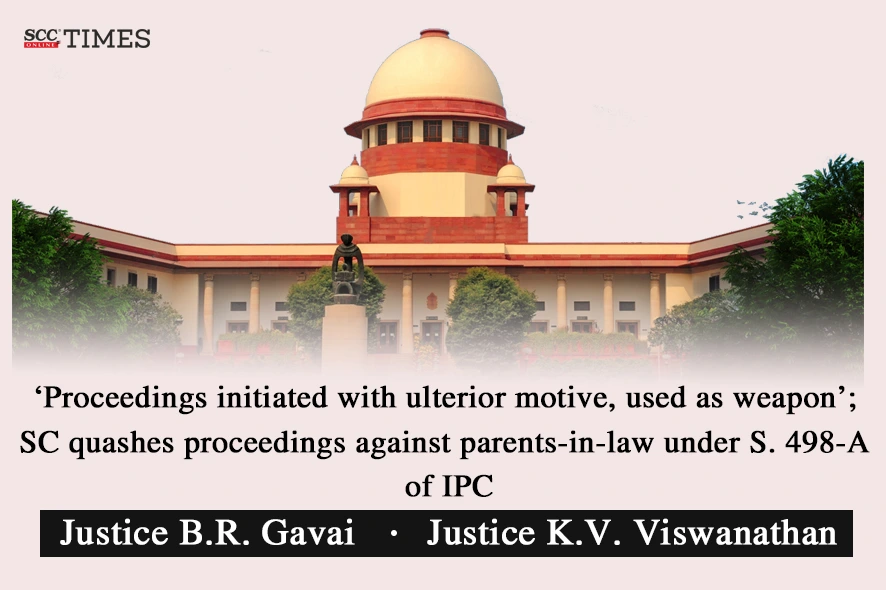Supreme Court: In a criminal appeal against a decision of the Bombay High Court, whereby the accused persons’ (parents-in-law) application under Section 482 of the Code of Criminal Procedure, 1973 (‘CrPC’) for quashing and setting aside the First Information Report (‘FIR’) for offences punishable under Sections 498-A, 312, 313 and 34 of the Penal Code, 1860 (‘IPC’) was dismissed, the Division Bench of BR Gavai* and KV Viswanathan, JJ. allowed their appeal, opining that only stating that cruelty has been committed due to some reason, would not amount to the offence under Section 498-A of IPC being attracted. The Court stated that the proceedings were initiated with an ulterior motive of pressurising the son/ husband to consent to the divorce according to the terms of the complainant-wife, hence, the Court set aside the High Court’s decision.
Background
The complainant-wife and the accused persons’’ son were married in 2006, and two daughters were born out of wedlock. After the birth of the second daughter in 2011, the husband and the in-laws/ accused persons demanded a son from her. Allegedly they insulted her and inflicted physical and mental cruelty, stating that she was giving birth to only daughters. Due to the ill treatment, she began residing separately from February 2018. It was further alleged that the in-laws used to instigate their son against his wife. It is further alleged that her in-laws also made her eat a poisonous meal, following which she had stomach pain, and she started bleeding which led to the miscarriage. It was discovered that a piece of the foetus was still in her womb, and she was treated for the same. Following this forced abortion, physical and mental cruelty, a complaint was lodged.
The in-laws along with their son filed a criminal application under Section 482 of the CrPC praying for quashing and setting aside of the FIR before the High Court. Meanwhile, the Family Court vide order dated 20-05-2019 granted a decree of divorce by mutual consent and dissolved the marriage between the wife and her husband. The High Court, vide impugned judgment dismissed the application under Section 482 of the CrPC for quashing of the FIR. Analysis and Decision
The Court remarked that for offence under Section 498-A of the IPC, there has to be cruelty inflicted against the victim which either drives her to commit suicide or cause grave injury to herself or lead to such conduct that would cause grave injury or danger to life, limb or health. The Court pointed out that the second part of Section 498-A refers to harassment with a view to satisfy an unlawful demand for any property or valuable security raised by the husband or his relatives. The Court said that in the matter at hand, no allegations fulfilled the requirement of the second part.
Regarding the allegations that in-laws inflicted mental and physical cruelty upon her as she could not give birth to a male child, the Court said that they appeared to be vague since no specific instances of harassment were mentioned. The Court pointed out that no specific role or allegation was levelled on either of the in-laws and no specific incident of physical or mental cruelty was mentioned. The Court stated that a mere omnibus statement was made that the physical and mental cruelty was afflicted because the complainant-wife could not provide a male child. Similarly, no specific or precise instances were mentioned as to how the in-laws instigated their son and what acts were committed by him as a direct result of such instigation.
The Bench relied on Dara Lakshmi Narayana v. State of Telangana, 2024 SCC OnLine SC 3682, wherein while dealing with similar facts, this Court held that vague allegations of cruelty were levelled by the complainant therein (wife) and the relatives of the husband (including the parents-in-law) were dragged into the crime without any reason; FIR lacked precise allegations, and that the FIR came to be lodged as a retaliatory measure intended to settle score with the husband and his relatives.
The Court reiterated that ‘cruelty’ is not enough to constitute the offence, it must be done with the intention to cause grave injury or drive the victim to commit suicide or inflict grave injury to herself.
For offence under Section 312 and 313 of the IPC which prescribes for ‘causing miscarriage’ and ‘causing miscarriage without woman’s consent’, the Court on perusal of the FIR and Doctor’s statement revealed that the complainant tested for her pregnancy herself prior to her visit to her hospital and that she was living separately from her husband and in-laws. The Corut pointed out that since she was living separately, there was no hint of any communication as to how did the in-laws have prior knowledge of her pregnancy and why did they visit her on the day of the incident.
Further, the Court added that the complaint was lodged after the notice of divorce was given by the complainant-wife, wherein, there was not even a whisper of the allegation of the cruelty or the miscarriage caused by the in-laws and husband. The Court also noted that the alleged incident took place in 2016, whereas the complaint was filed after the notice of divorce was given by the complainant, i.e. in 2018. Regarding the explanation for the delay in filing the complaint given by the complainant that she did not want to spoil the marital relations, the Court pointed out that she stated that she began residing separately and had moved out of the matrimonial house.
Thus, the Court concluded that the proceedings were initiated with an ulterior motive of pressurising the son/ husband to consent to the divorce according to the terms of the complainant-wife and the proceedings were used as a weapon by her in the personal discord between the couple. The Court opined that allegations made in the FIR or the complaint, even if taken at their face value and accepted in their entirety did not prima facie constitute a case against the accused persons and that the High Court was not justified in quashing the proceedings, and that this was a fit case wherein the High Court should have exercised its inherent powers under Section 482 of the CrPC to quash the criminal proceedings.
CASE DETAILS
|
Citation: Appellants : Respondents : |
Advocates who appeared in this case For Petitioner(s): For Respondent(s): |
CORAM :










